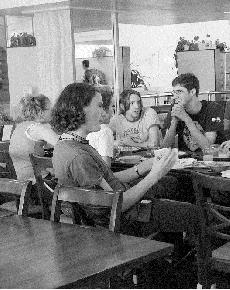Vegetarians look for meal options in dining hall

Carol Matteucci
Sep 21, 2004
Last updated on May 11, 2016 at 03:47 p.m.
Tim Vieira has had the same food at nearly every meal since moving into the residence halls this year – spinach, kidney beans, chick peas and rice, all topped off with peanut butter.
Vieira, freshman in engineering, is one of a growing number of vegans and vegetarians at the University. Although the University is making an effort to cater to them, these groups still face challenges as they try to adapt to the dining hall menus.
While vegetarians do not eat meat, vegans eat no products derived from animals, including honey and dairy products. This makes the transition especially difficult.
“This school is definitely not at the forefront of vegetarian dining,” said Matt Cheney, graduate student and president of the Campus Vegetarian Society. “I think they certainly could do a better job, especially for people who are vegan.”
Get The Daily Illini in your inbox!
The dining halls have one hot vegetarian option each day, as well as pasta and a salad bar. If a vegetarian does not like the hot item, however, they might have to eat the same meal every day.
Jackie Roe, senior in LAS, is a vegetarian who lived in the residence halls for three years. She said it was difficult to find both variety and nutrition in her meals.
“For a while, I literally had pasta every night,” Roe said. “The vegetarian entrees were sometimes really bad. Because there’s only one of those, there has to be more consideration towards making those really good. Sometimes there would be nobody eating it at all.”
Kirsten Ruby, assistant director of housing for marketing, said the stigma associated with vegetarian food prevents University housing from providing more dishes.
“A lot of people won’t eat food if it’s labeled as vegetarian. That’s an obstacle,” Ruby said. “It’s an interesting balance because (vegetarians) are very conscious of what they eat, but are a small segment of the population.”
Bernice Woo, assistant director of dining services, said space is also a barrier.
“The dining halls are really small,” she said. “There just isn’t room to produce two of everything. Until we have better facilities we are stretched to the limit already.”
Even with appetizing dishes for vegans and vegetarians, students say it is sometimes hard to tell which are vegan, short of seeking out the dining hall manager. Roe said dining hall food labels should be clearer.
“My freshman year (2001), they had labels to say what was in all of the foods, but they took those away,” she said.
Despite the challenges vegetarians face, progress has been made. In the past five years, housing has added pasta at every meal, soymilk dispensers and included vegetarian options such as veggie burgers at Late Night, which provides meal options after normal dining hall hours.
The University created the Field of Greens specialty dining hall at Lincoln Avenue Residence Halls, which features a vegetarian menu for lunch every weekday. However, this option has not been well received by some vegetarians.
“It should be called Field of Cheese,” said Vieira, who is a vegan. He said most of the food he has found there included dairy products. “It’s as hard to eat there as in any other dining hall.”
Field of Greens’ lack of popularity has prevented its expansion. Woo said only 50 to 70 people come through for lunch each day. She said vegetarians want to eat with their friends, who usually prefer to eat in regular dining halls.
Outside of Field of Greens, it takes creativity to get by as a vegetarian.
“Being in the dorm is a wakeup call to find more ways to be healthy,” Roe said. “You can’t do much with pasta, but you can make a fun sandwich, or make nachos. There are a lot of vegetarians who don’t know how to substitute nutrients you get in meat.
“You need to do research and find out what you need and figure out how to get it in the dining halls. You can’t just have bread and pasta all the time,” she said.
Ruby agreed that ingenuity is invaluable to vegetarians.
“With a little creativity, you can take rice from hot food, veggies from the salad bar, and make a nice meal,” Ruby said. “You kind of have to look at ‘What are my options today?’ and make a good meal out of it.”
Don Block, the associate director of dining halls, meets regularly with focus groups to discuss topics like vegetarianism, and Cheney said members of housing met several times with the Campus Vegetarian Society.
“They were very receptive to our concerns,” Cheney said. “They seem to care a lot that students eat nutritiously.”
Despite the University’s efforts, though, vegetarian students might find themselves eating out more than they would like to.
“It’s improving,” Roe said. “But it’s not ideal.”





